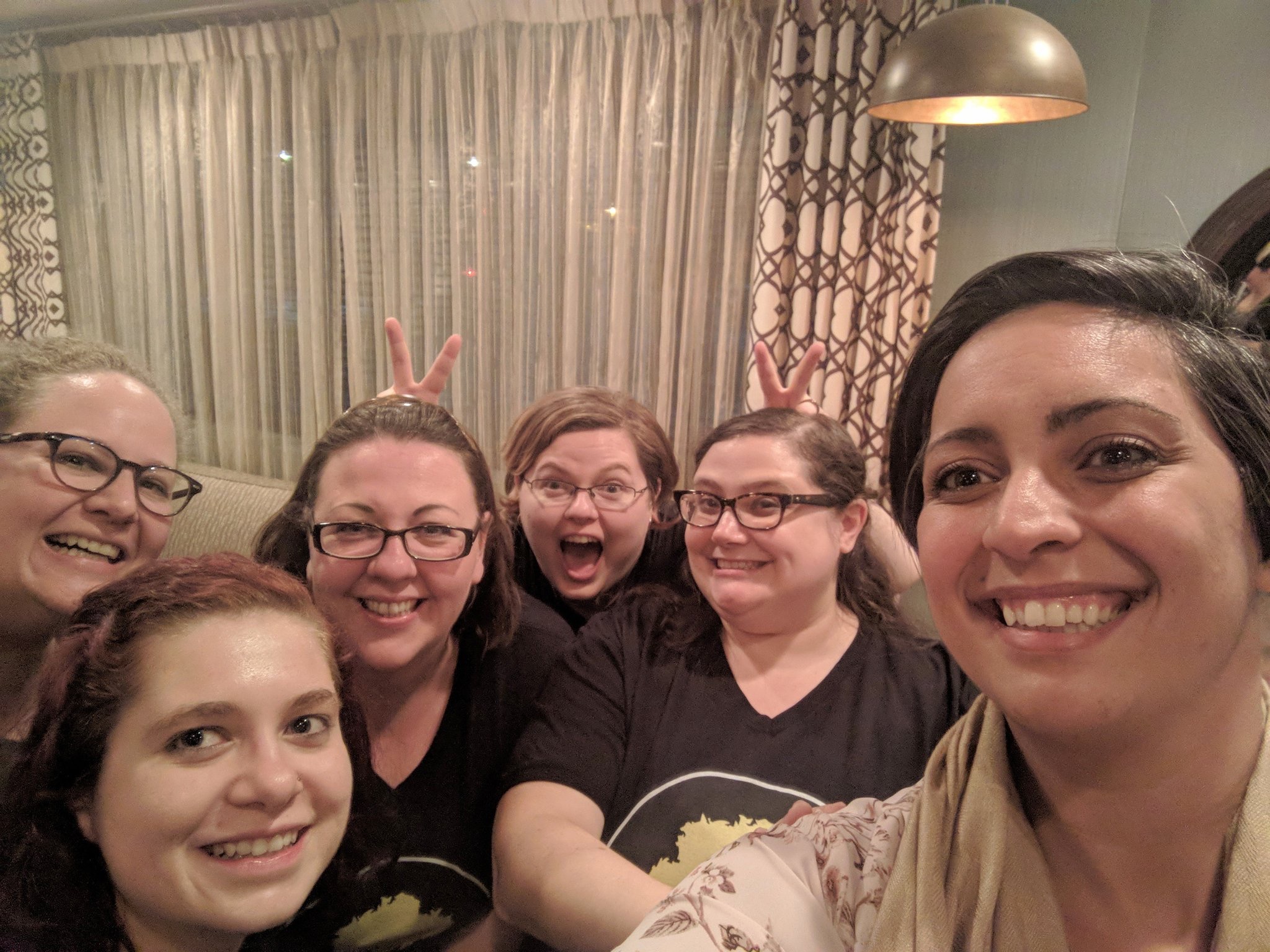
I wasn’t supposed to go to the Red Bank Authorpreneur Workshop put together by Corvisiero Literary Agency at the beginning of October. Things had been absolutely nuts in my life, and I hadn’t been able to recommit myself to my edit of Never Say Never, the book I would pitch there. However, Maria Tureaud and Ari Augustine from Craft Quest were going to be there. I had been working with Maria and Ari on videos for Craft Quest for eight months, and had known Maria even longer than that, having worked on her manuscript for the Inkwell Council. I really wanted to go, if only so I could get to see my friends for a weekend in person, for the first time ever. It didn’t help matters when my co-worker on Inkwell and Craft Quest/my sister-in-law Megan Manzano, who is working as an intern at Corvisiero, decided to come help out with the conference. Now I needed to go. I bought my ticket. I booked my hotel. I re-dedicated myself to my final Never Say Never edit. I wrote my pitch. And I made my way to New Jersey with Megan as my travel partner.
That was why I went. But I left with so much more. Warning, this one is going to get long. Because I’m going to take you along on my weekend and tell you everything I learned about myself and writing on my weekend away.
Friday Night
Here, I paint you the picture of an anxiety-ridden writer. Since I’m not much of a traveler, my friend Denise lent me her rolling suitcase so I could carry all of my stuff, seeing as I have a bad back. I spent the entire night before panicking as I packed. How was I going to get this bag down the stairs? Was I gonna be able to drag this thing all the way through my half hour walk to drop my son off at school? Would I fit on the always over-packed bus I take from there to the subway? How would I get up the train steps with their lack of elevators? How many people at my job would question me about where I was going? Would I make it to Penn Station in a decent amount of time? WHAT EVEN DOES PENN STATION LOOK LIKE? I’d never been there. WERE THERE STAIRS?
In the end, it was really hard to get the bag out of my house, but everything else went super smoothly. And when it didn’t, Megan had already met with me and just started lifting my bag around like it was feather-light…which was only a little bit insulting. Stupid bad back…grumble…
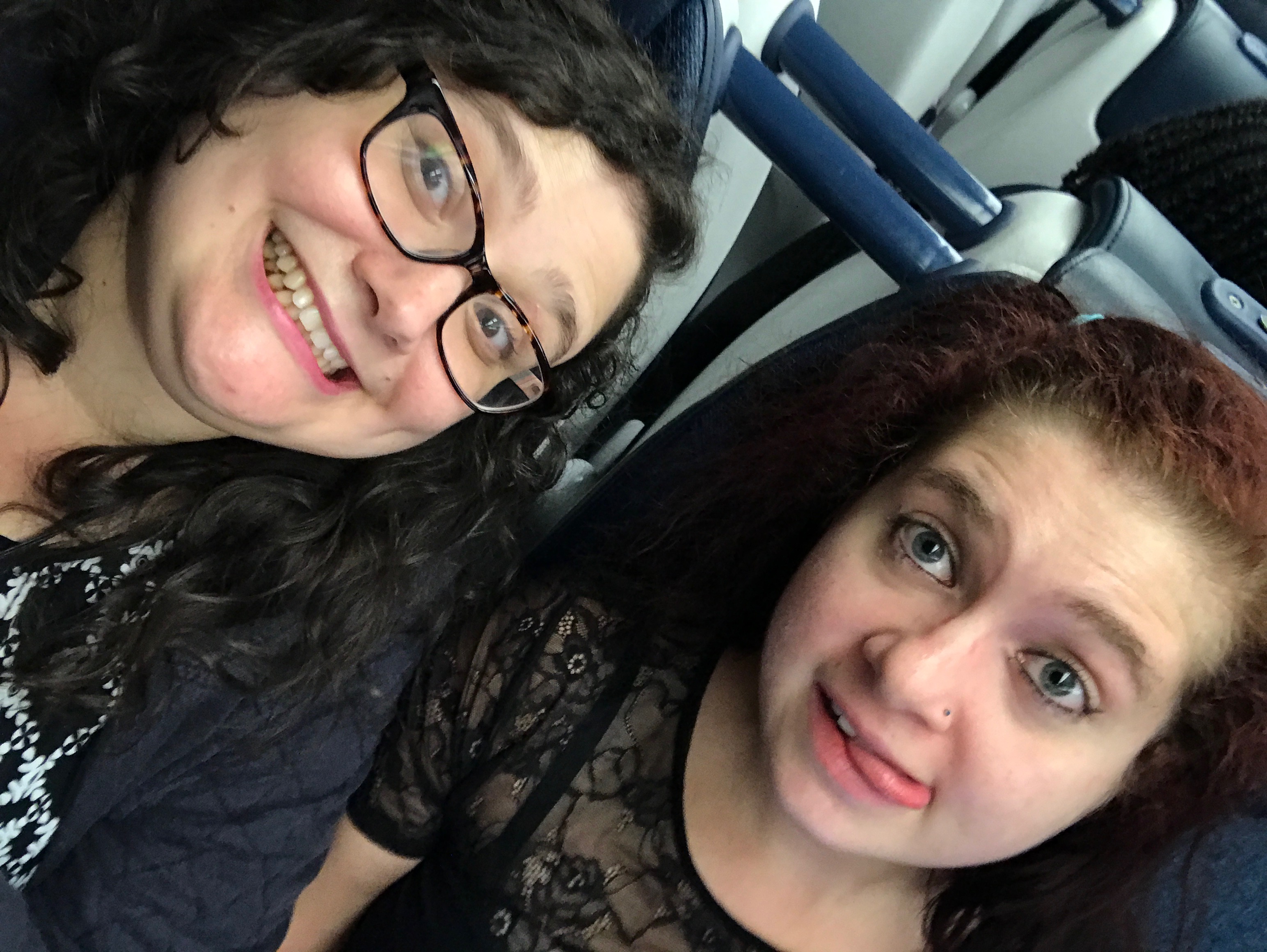
Maria picked us up at the train station along with editor extraordinaire Jeni Chappelle whom I’d actually met when I was in Pit2Pub 2016. We had only corresponded here and there until we worked together on a video on editing for Craft Quest. By this point, she was a friend and Megan and I were so glad to meet up with her at the train station. Jeni was staying in the same hotel as us, with writer R. Mitto E. who also turned out to be super cool.

We rode to the hotel, got settled in our rooms and met up with Ari, who was already in the room she would be sharing with Maria. Once we were each more comfortable, we headed down to the lobby to grab a bite to eat and ended up taking over the hotel restaurant for an impromptu pitch drafting session with Ari.
While Megan and I headed back to our hotel room to get a decent night’s sleep, particularly because Megan already knew she’d be running around the conference the following morning, as an intern helping to keep everything running smoothly. I needed it because ever since fibromyalgia made its landing in my life, my brain is shit before noon…and I had all my pitches before noon. While we slept soundly, Maria, Ari, R., and Jeni stayed up late into the night, nailing down Maria and Ari’s pitches.
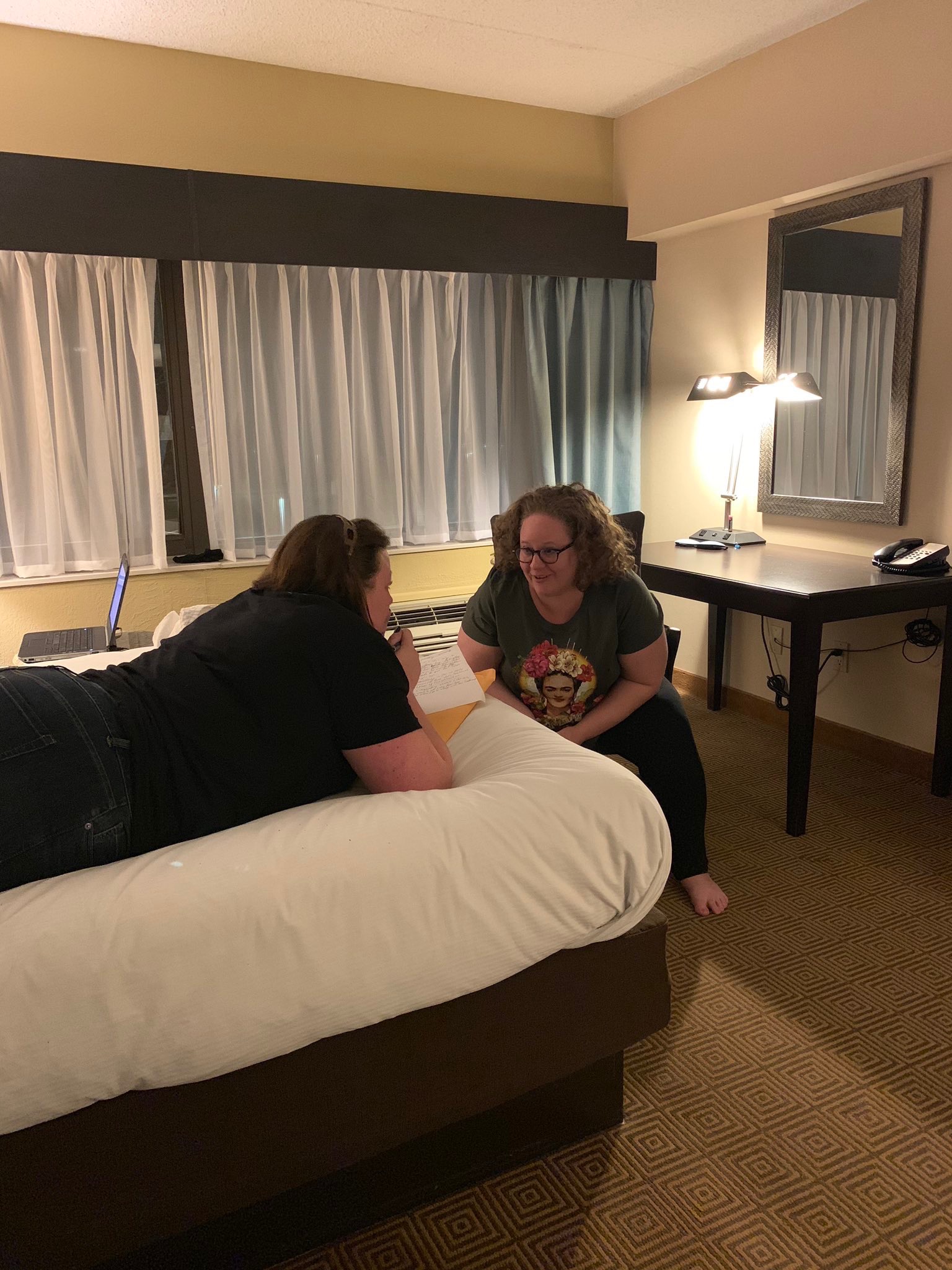
Saturday Morning
I woke up first, and though a series of mishaps (a broken coffee maker, a loud ironing board, a clumsy woman who tries to iron the iron’s wire into her shirt, then whisper-curses herself out) I managed to wake my roommate up a little earlier than planned. (“I tried to be quiet.” “Like when you were skinning that cat.” “That was the ironing board!” “I know, and you told it to be quiet.”)
Together, we proved that we totally could have been real-life roommates by seamlessly dancing around ourselves to get ready. And I proved what a disaster human I am when I got out of the shower, and my adorably curled hair somehow got straighter–except for the front, which frizzed into madness. I glared at myself in the mirror and did nothing. I’m not good at hair. After squeaking at my reflection for about ten minutes. Megan braided the disaster areas of my hair and managed to make me presentable. We then met up with Ari and Maria and headed over to the workshop.
Thank God for Megan, and thank God for the Dunkin’ Donuts super close to the location of the workshop. Dunkin’ selfie!!!

The first thing I did upon signing in was register for the synopsis workshop at the last minute. I’ve never been the best at writing a synopsis of my own work. There is something very difficult about reducing your work to its bones and it always reads robotically, which I keep hearing is a mistake. A workshop could really help.
There was continental breakfast waiting when I arrived in the ballroom where the event was being held (sidebar: this hotel is beautiful), but I was too nervous to eat and already hopped up on adrenaline and coffee. So I never got the opportunity to sample the offerings.
Before things even got started, I decided it would be funny to get Ari’s attention by throwing the complimentary mints we received at her. It bounced off the table and landed right in front of Marisa Corvisiero. I smiled my ‘Oops, I’m an idiot’ smile, which is 110% teeth. She teasingly designated me the troublemaker of this get-together. I have no idea what she means. My horns are fully hidden by my halo.
Anyway, after some brief announcements, Melissa Koberlein approached the stage. Melissa is a professor of communication and publishing, and a YA Science Fiction writer with a biting sense of humor and some damn good advice on public speaking. She gave a lot of great advice in her segment, but the one that really stuck out to me was the idea that you’re nervous talking about your work because you’re passionate about it. You wouldn’t be nervous if you didn’t care. This fact helped me so much when I went into the pitch room. It reminded me that it was okay to be nervous, because it showed my passion for the project.

Melissa also conducted a great ice-breaking activity in which she had each attendee pick a piece of candy from a bag. When everyone had one, she had the people who had the same type of candy meet up and give each other a quick elevator pitch of their book. Not only did this help me get to know a couple of the other attendees, but it made me speak to people that weren’t Maria and Ari, which was necessary at that point to shove past my social anxiety. I definitely left this segment ready to pitch.
After this, Marisa returned to discuss what comes next once you’ve written the book. She reminded us of something I have to personally echo–the industry is smaller than you think. Throughout the day, when people were mentioned, often they were familiar to all of us, even our fellow writers attending the conference. If you pay attention, it’s a very small world out there.
Marisa’s main point, and what ended up being the springboard to all of the other segments of the day, was that authors in our current climate need to think like Authorpreneurs. Writing is a business, the book is your product, your name is your brand. Your platform is any way in which you reach fans. Treating your book, your career, in this way, dictates how you conduct yourself, and gives you an edge in an extremely competitive market.
Can you get published without treating your book like a product and your name as a brand? Sure. But it will be that much more difficult.
Next up for me were my agent pitches. While I was waiting to go in, I also got the bonus of calming down by chatting with Megan, R., and Melissa, and sometimes Ari and Maria in between pitches. This helped immensely in easing my nerves and got me walking in the room to pitch as myself and not my weirdly stiff representative.
Agent 1 was super easy to talk to, and since we follow each other on Twitter, it was very easy to get comfortable in my first pitch. We chatted about the book for awhile and she laughed along with me as I explained my main character’s hijinx and her natural sassiness. She asked me to send her more. The ten minutes felt so long–not in a bad way, but it just felt like I got the story out and then we had time to chat about Maria’s awesome Irish accent, and a shared affinity to accents in men before time was up. Not only would I love to work with this agent, but she was a lot of fun to talk to, and definitely loosened me up to move through my pitches for the day.
Agent 2 seemed super excited about my work. She said it sounded like her catnip, which revved me up, and it didn’t hurt that we had similar taste in television and books. She seemed excited about one of the more difficult parts of Never Say Never, the topic of infidelity. Dealing with such a negative relationship issue in a romantic comedy can be a tough sell. Agent 2 seemed very interested in the idea that I would mix the lightness of the general story with a heavier topic, without weighing it down too much. I got my second request of the day.
Agent 3 was also interested in my story, but interestingly enough, her point of view on the way I handle the topic of infidelity was the exact opposite of Agent 2. She feared that it was a little too lighthearted for me to tackle the topic of infidelity appropriately. I could absolutely understand her feelings about it. She still made a request, and I told her I hoped I’d managed to write it with sufficient gravity for her tastes. It turned out, I didn’t. As of this week, she sent a rejection, but I absolutely appreciate her taking the chance and reading it, since she was already a bit iffy about the concept.
Most importantly, my interactions with Agent 2 and 3 taught me how subjective this entire process truly is. Agent 2 and Agent 3 had exactly opposite feelings about the very same concept. If that isn’t proof that not every agent is the one for you, I don’t know what is.
When I returned to my seat, the plotting segment was just wrapping up, so I unfortunately didn’t catch much of it.
After that came lunch, where there was an amazing selection of food waiting for us to choose from. After piling our plates high with–at least in my case–an absurd amount of food, I joined some of the more recognizable faces from the morning, and joined in a conversation that touched on topics far and wide. One thing was for sure–even with the strange dips and turns of the conversation–I was amongst my people.
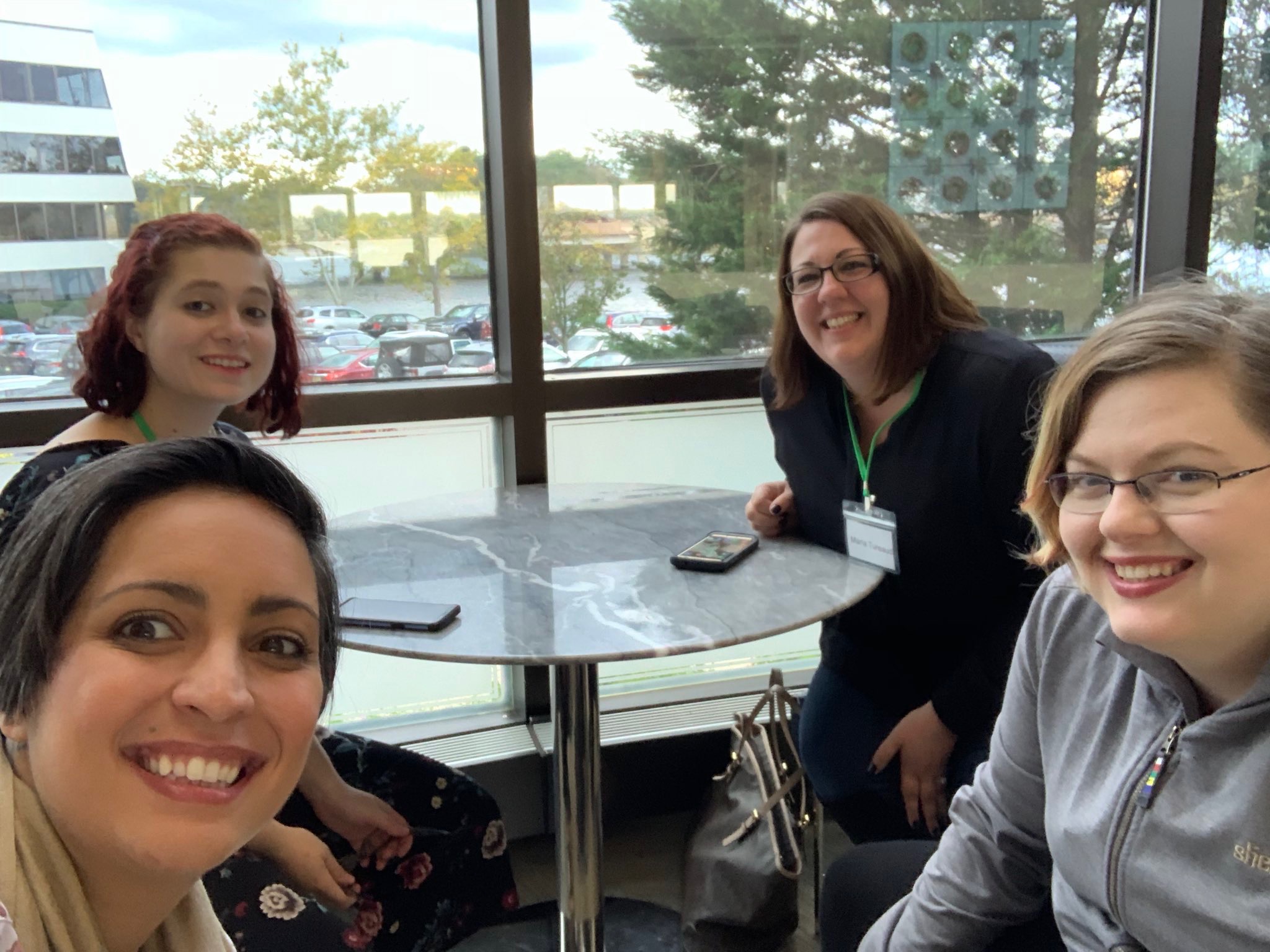
Saturday Afternoon
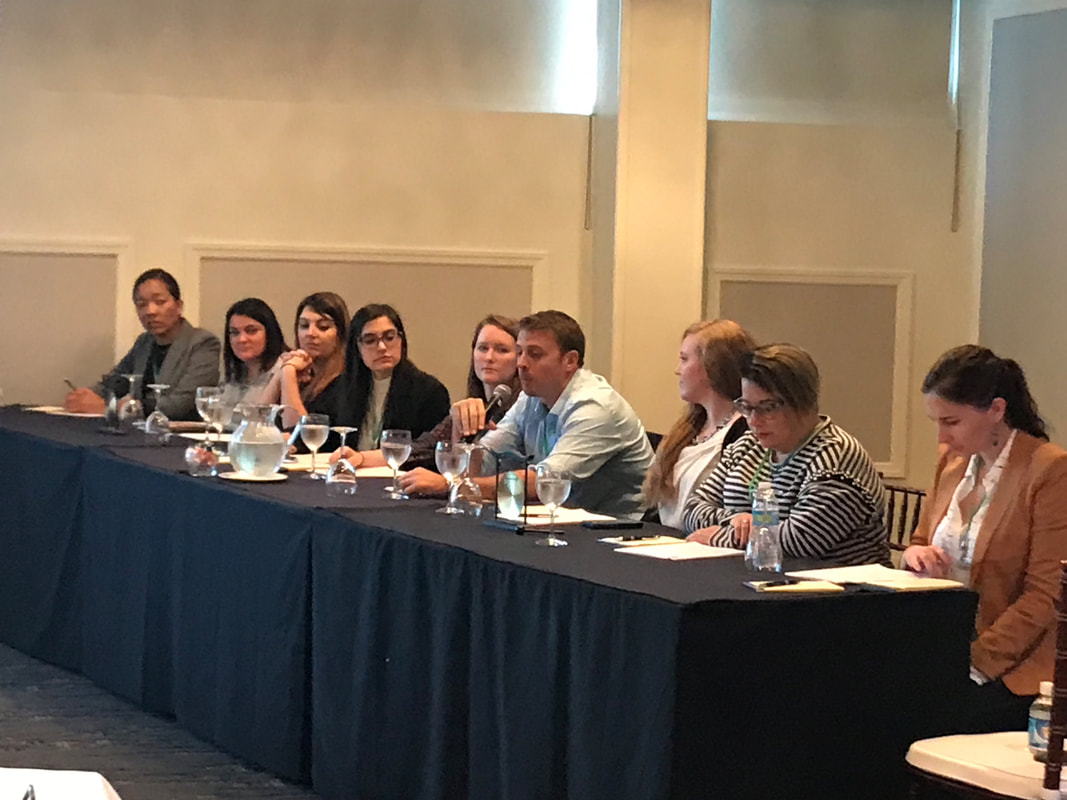
The gong show! A bunch of authors submitted the first page of their manuscripts. Since it was only an hour long, they were definitely not going to be able to get through all of them. The rules of the game were that the first page would be read for a panel of editors and agents. As the page was read, the panel would hit the gong at whatever point they would stop reading. This was a very interesting peek into the minds of editors and agents, and what really catches them during the opening lines. Some of this was majorly subjective. There were notes on not liking particular genres or vibes. However, much of it was also valuable–a confusing line or a more interesting background character can suck the life out of a manuscript quickly.
And I will never get over my pride when Ari’s first page was the only one not to get gonged. It was a very exciting moment.
The synopsis workshop, led by Corvisiero agents Kelly Petersen and Saritza Hernandez, taught me a few very interesting ideas about how to go about attacking one. As with the other informational sessions I’m mainly going to include the things I hadn’t learned in other attempts to learn about the topic. For one, I learned to give the reader a good idea of setting. With my story in particular, I realized I needed to include a bit of the small town vibe of the story.
There was also the idea of adding the tone and voice of your story into your synopsis, something I sadly realized was sorely lacking in my synopsis. I resolved to ask the Craft Quest team for help with this later. One method that was suggested to manage this was to start by taking one or two sentences from each paragraph of your story and putting it into a document. From there, you would pare down until you reach two double-spaced pages.
There was also a comment about being careful about using too many names all at once. This screamed at me. The Order of the Key, the first novel I had attempted to have published, had a ton of characters in it, many revealed early on in the story. I couldn’t remember my synopsis for Order, but I was certain it had name dumped quite a bit early on. Though I have temporarily shelved Order, temporarily is the key word. I have never given up on it. I knew that before I put Order out into the world again, I would have to look for that issue in the synopsis.
Another tip that stuck with me was about Hemingwayapp.com. I had heard about this app before, but I hadn’t realized it assigned a reading level to your story. Kelly and Saritza told us that for YA, your readability level should be around 4th and 5th grade, even though the concepts could be more intense than what would be used for that age group. YA should be easily readable. This app can help show you how to reach that readability level.
The next segment was about demystifying book deals, and started with a reminder that when you sell your book to a publishing company, you aren’t selling the book, you’re selling a license to your book. That’s an important distinction, because the book is still the artist’s creation. There was a great discussion of the different portions of a book contract and what an author and their agent should look out for. For me, personally, who worked for five years as a secretary in entertainment law, many of these terms weren’t new for me, but I still learned a few interesting bits.
I’d worked with various other types of contracts, but not book contracts specifically, and I never realized that authors could sometimes have non-compete clauses in their contracts. A non-compete clause limits how much of the work that is contracted can be excerpted and printed elsewhere, as well as what other works can be contracted by other companies. This can be limited by genre as well as time period with similar or related work and can limit the timing of the release of other books. So, it’s an important clause to pay attention to, especially if you’re pursuing a career in hybrid publishing.
Another factor that’s important to realize is that there is no marketing plan in publishing contracts. Authors and their representatives should always ask the publisher about the marketing plan and whether or not they will assign a publicist. This is increasingly true in the era of social marketing, so it’s a good thing to know when signing with a publisher.
The event wrapped up with a visit from the Blessing Bag Brigade of NJ founder Kevin Garrison. If you’ve never heard of this organization, learn more here. Everyone was encouraged to bring donations to the event, and at Mr. Garrison and Marisa’s lead, we packed our own Blessing Bags to be given to the homeless. It was a fine close to the event to remind us of what we have, and what we should give back.
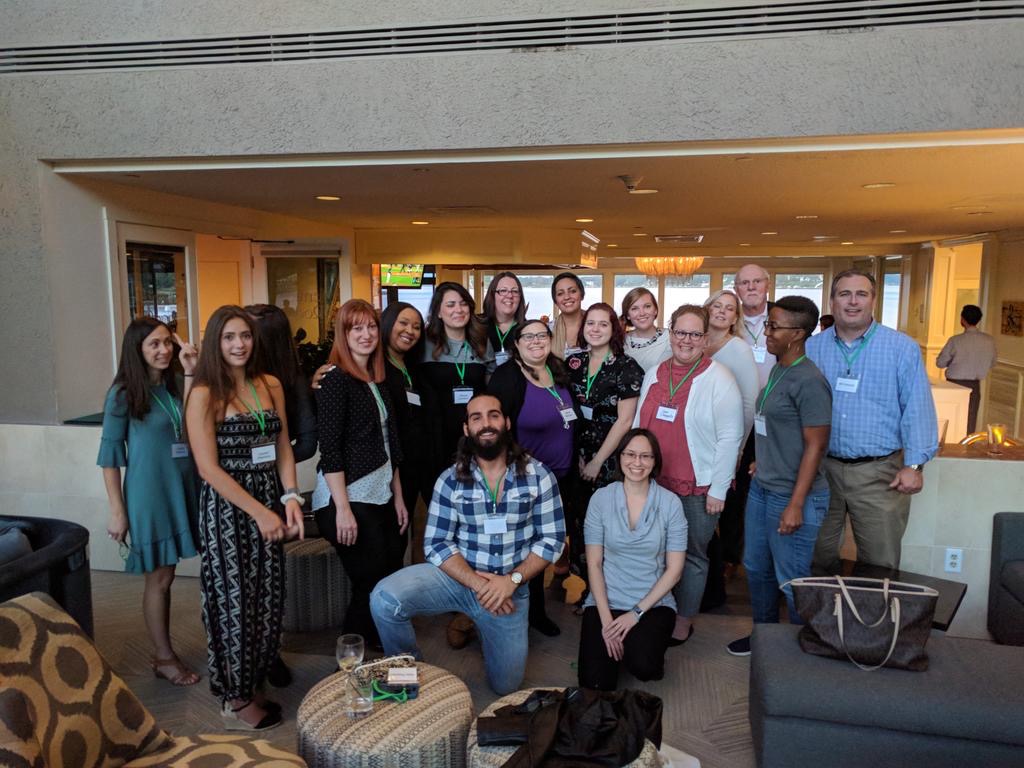
The afternoon wrapped in a lovely mixer, in which we had time to chat it up with each other and industry professionals who were attending. There was a ton of laughs and silliness, and shared jokes, and by the end of the evening, I found myself as part of a group twitter chat with these amazing, intelligent, and frankly, hilarious folks. Though a confluence of wacky events led to our core four Craft Questers eating dinner back at our hotel, we were soon followed there by Jeni, R., and Ella, for drinks and further silliness.
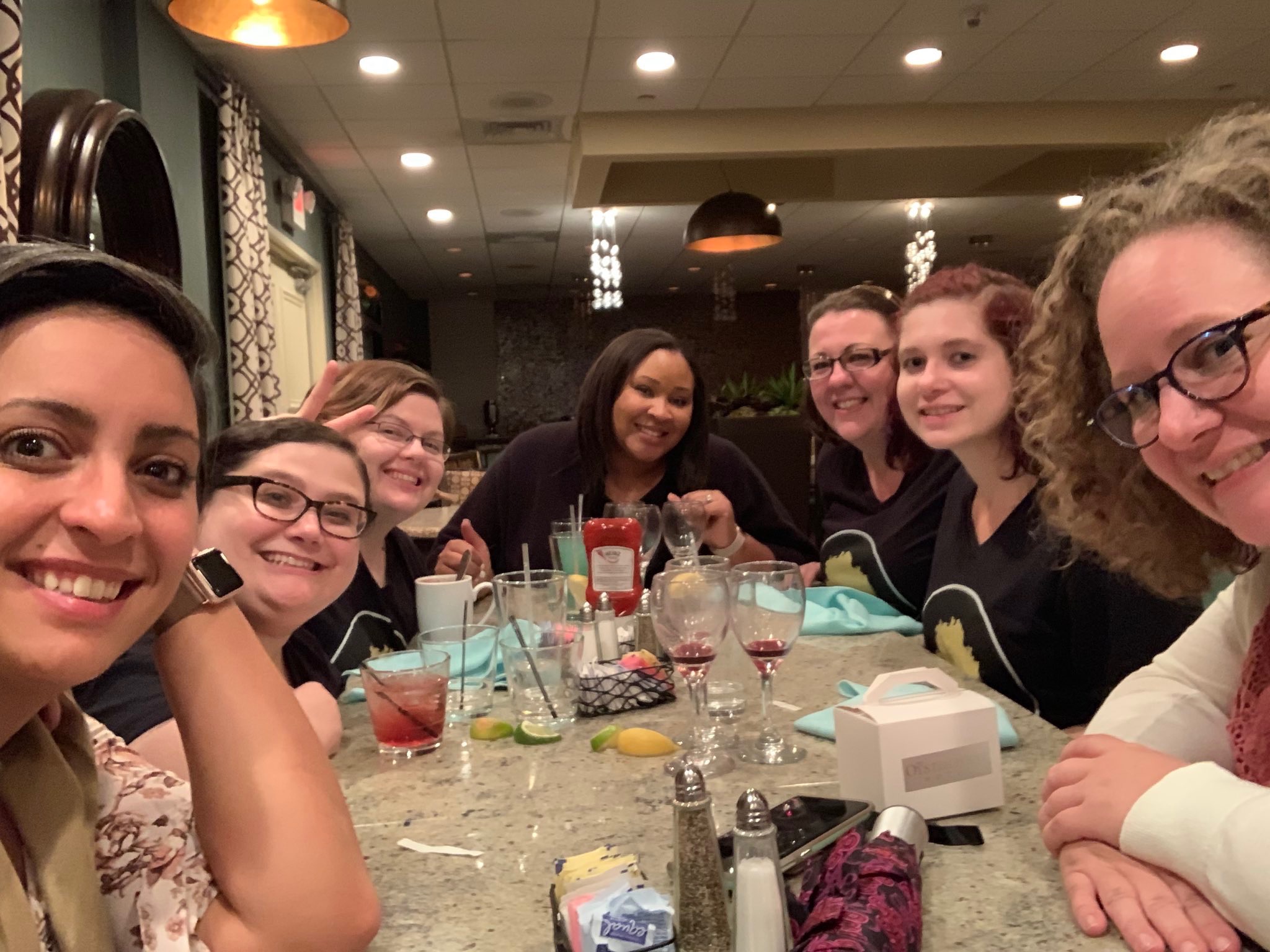
We stayed and drank until the hotel bar was overrun by two weddings, and we Craft Questers retreated to Maria and Ari’s room, where we chatted, remained ridiculous, and did the usual slumber party activities.
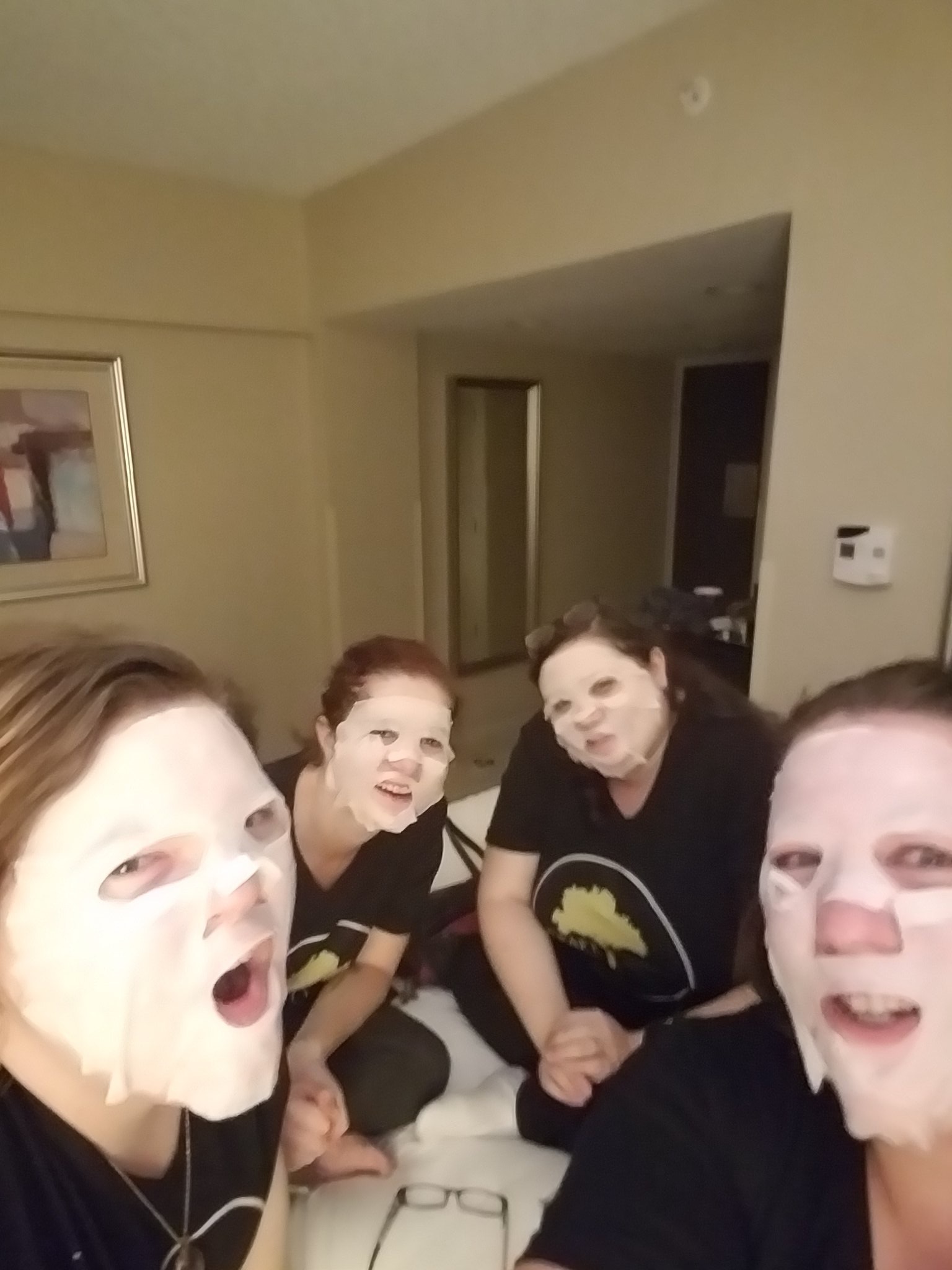
At three in the morning, after falling asleep on Maria’s bed, I was shaken awake by Megan, who dragged me off to our room. We ended up in the wrong elevator, and despite being one floor away, ended up in the basement. After that, we finally retired to our room for sleepy times.
Sunday Morning
I woke up at an absurd time in the morning which was bizarre after going to sleep at 3 AM. Megan oddly woke up only shortly after. A quick text to Maria showed that Maria was also awake. So, we gathered in Maria’s room and harassed Ari until she rose from her slumber.
We grabbed some hotel breakfast, which was, indeed, nommy. After breakfast, we headed upstairs to work on my synopsis, because Maria is a literal hero. She helped me to rewrite the whole thing according to what I’d learned the day before at my workshop.
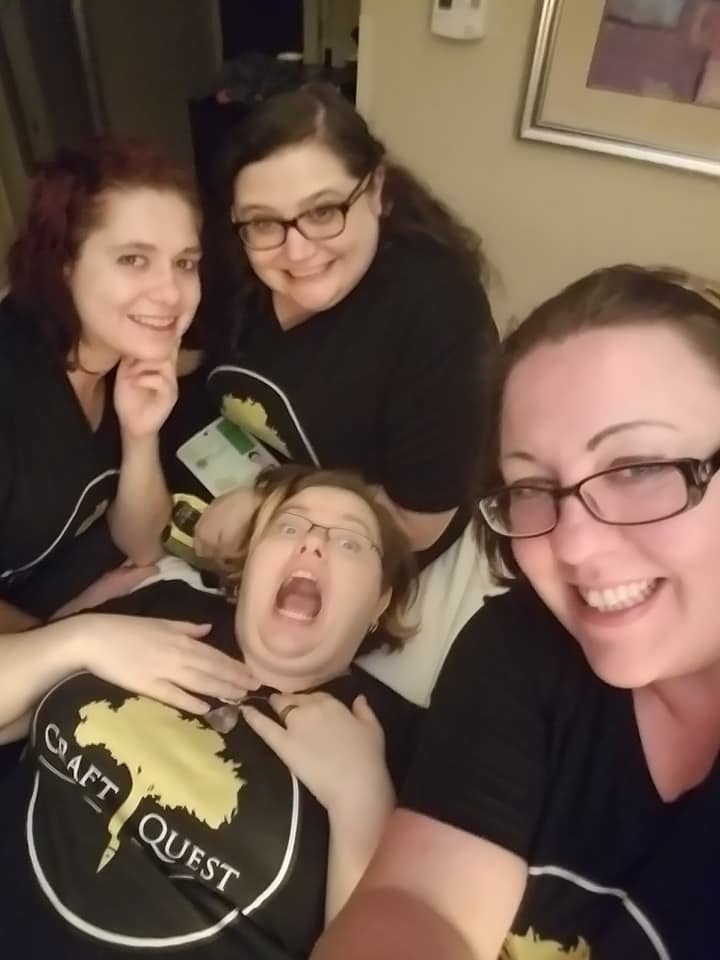
After hanging out in Maria and Ari’s room and having several laughs, it was sadly time to go.
We piled into Maria’s car to drive to Newark. The goodbye was tough. I’d seen and spoken to these ladies online many times in the past, but in that one weekend, we bonded so tightly, that Megan and I truly didn’t want to leave them. A long conversation, starting in that car ride, and continuing on through the train ride home, became the seed of a huge announcement I’ll be making soon.
Megan and I met up with Ismael, my husband, and our son, Logan, and we all got to share the adventure of our weekends apart. Ismael dropped Megan off at home to make up for the sleep she’d missed. By the time I was home and taking a nap, my phone was buzzing with fun texts from the Craft Quest team, the chat we’d established with all the ladies we’d befriended at the conference, and one more group–The Sisterhood of the Traveling Pantsers, a group of writers and editors comprised of R., Jeni, Maria, Ari, Megan, and me. It’s nice to have a strong circle of writer/editor friends to toss around ideas and thoughts and frustrations with.
It feels like, in one weekend, I crossed over into a new era of my writing career, and I’m very excited. The conference really got me thinking about new directions to take with my work, and the people there helped me find new confidence in my work and myself, and new friends. It was definitely worth the price of admission.
Lots of good news to come, including an interesting announcement from The Inkwell Council. I can’t wait to fill you in.
